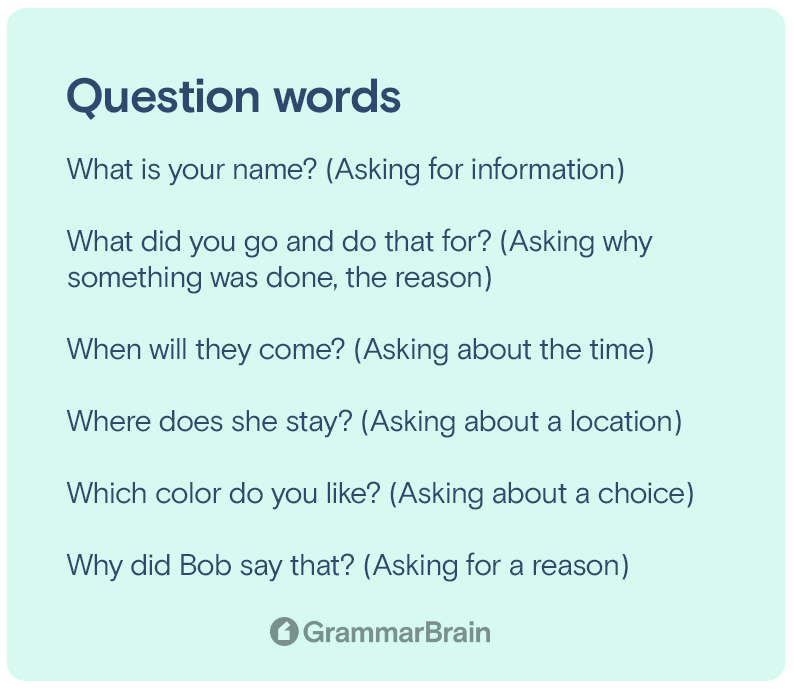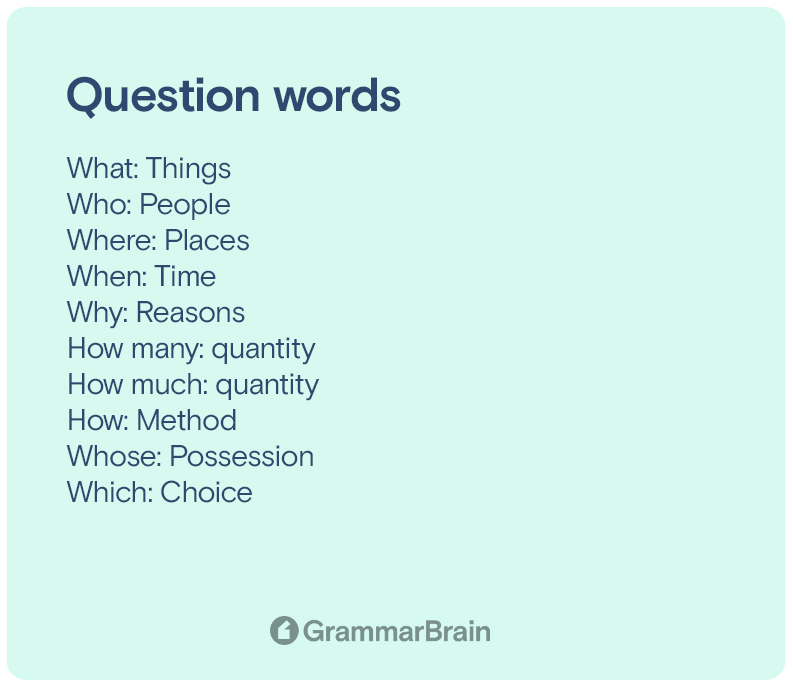What are question words? Different words in the English language are used for different purposes in speech and writing. Consequently, when a message must be conveyed in speech or writing, a range of words can be chosen to do this. For instance, if an exclamation is required, there are particular words used to convey this. Similarly, to ask specific kinds of questions, question words are used.
Let’s learn about question words in the English language…
What are question words?
In the simplest terms, question words are interrogative words, and are called such. These words introduce or ask a question that cannot be answered by a simple “yes” or “no”.
Question words are referred to as “wh” words in English sometimes. This is because most of these words begin with the letters “wh”, like “where” and “what”.
A question word or an interrogative word is, in the truest sense, a word that has a specific function in writing and speech. Question words have different uses, depending on the sense of the language that the person speaking or writing wishes to convey.
Consequently, these words may be used as direct questions or indirect questions.
Additionally, such words in the English language (and other languages) may be used in relative clauses as relative pronouns. The examples below show the extent of the use of question words:
- Where are you rushing off to? (Direct question)
- I wonder what he is doing today. (Indirect question)
- The city where Mary lived (Relative pronoun)

What question words are commonly used?
The commonest question words that are used in the English language are the following:
- Who (for people)
- Which/what (for things)
- Why (for reasons)
- When (for time)
- Where (for places/locations)
- How (to get more information)
Other question words
When speaking of a question word or an interrogative word, in a way that denotes the purpose of asking a question, there are other words used too. In this sense, the use of question words is a bit tricky. Questions can be formed by placing a modal verb or an auxiliary verb before the subject when making a sentence. View the examples below:
- Does the dress suit Mary?
- Shall I transfer you to Jim?
- Can I order the coffee now?
While these may be considered interrogative words (opinions vary on the matter), the sentences that they are formed with result in a “yes” or “no” response. Consequently, according to the definition stated earlier, they may not be classified as true question words, although they are used to ask questions.

Examples of question words
- What is your name? (Asking for information)
- What did you go and do that for? (Asking why something was done, the reason)
- When will they come? (Asking about the time)
- Where does she stay? (Asking about a location)
- Which color do you like? (Asking about a choice)
- Who lives there? (Asking for information about a subject)
- Why did Bob say that? (Asking for a reason)
- How does the machine work? (Asking about the manner or function)
- How was the French exam? (Asking about the quality of something)
- How many cars does he have? (Asking about quantity)
Each of the words that begin a question in the questions above is an interrogative word, with different uses.
That is, the responses generated vary depending on the question word used and how it is used. It is also important to note that a single question word can be used to elicit different responses when used with other words.
For instance, notice how the word “how” is used as a question word in three differently purposed questions.
How are question words used? Examples of use
The previous section shows how question words occur in phrases (questions) and displays their use as well. Nonetheless, there are certain rules and hints that can help in making the use of question words easier. In the list below, more details of each question word and its purpose is mentioned, with a clear example to learn how to use the interrogative word in a question:
- Who – Used to ask about a person, the subject. E.g. Who is that girl?
- Whom – Used to ask about a person (object). E.g. Whom did you visit?
- Whose – Used to imply ownership. E.g. Whose wallet is that?
- Where – Used to imply a place, a location, or a position. E.g. Where is the cathedral?
- When – Used to imply the time, the moment, or the occasion. E.g. When are they arriving in Paris?
- Why – Used to imply an explanation or a reason. E.g. Why are you absent from work?
- Why don’t – Used to imply a suggestion. E.g. Why don’t you eat your meal now?
- What – Used to ask about a specific object/thing. E.g. What is the matter?
- What … for – Used to ask for a reason. What did you go there for?
- Which – Used to determine a choice or an alternative. E.g. Which is the best sport?
- How – Used to determine the manner, way, or form. E.g. How do you go to work?
- How much – Denoting a price or a quantity. E.g. How much are those apples?
- How many – Denoting a quantity. Eg. How many students are enrolled at the college?
- How often – Determining frequency. E.g. How often do you visit your aunt?
- How old – Used for age. E.g. How old is she?
- How far – Used for distance. E.g. How far is your school from your house?
FAQs
1. Can question words appear in the middle of a sentence?
Question words can appear in the middle of a sentence. If this is the case, then they are termed relative pronouns.
2. What is the other word for a question word?
The other word for a question word is an “interrogative word”.
Sources
- Question words – Grammar – Cambridge Dictionary
- WH Questions Words: 8 Basic Question Words with Definition & Useful Examples – ESL Grammar
- Interrogative word – Wikipedia
Inside this article
Fact checked:
Content is rigorously reviewed by a team of qualified and experienced fact checkers. Fact checkers review articles for factual accuracy, relevance, and timeliness. Learn more.
Core lessons
Glossary
- Abstract Noun
- Accusative Case
- Anecdote
- Antonym
- Active Sentence
- Adverb
- Adjective
- Allegory
- Alliteration
- Adjective Clause
- Adjective Phrase
- Ampersand
- Anastrophe
- Adverbial Clause
- Appositive Phrase
- Clause
- Compound Adjective
- Complex Sentence
- Compound Words
- Compound Predicate
- Common Noun
- Comparative Adjective
- Comparative and Superlative
- Compound Noun
- Compound Subject
- Compound Sentence
- Copular Verb
- Collective Noun
- Colloquialism
- Conciseness
- Consonance
- Conditional
- Concrete Noun
- Conjunction
- Conjugation
- Conditional Sentence
- Comma Splice
- Correlative Conjunction
- Coordinating Conjunction
- Coordinate Adjective
- Cumulative Adjective
- Dative Case
- Determiner
- Declarative Sentence
- Declarative Statement
- Direct Object Pronoun
- Direct Object
- Diction
- Diphthong
- Dangling Modifier
- Demonstrative Pronoun
- Demonstrative Adjective
- Direct Characterization
- Definite Article
- Doublespeak
- False Dilemma Fallacy
- Future Perfect Progressive
- Future Simple
- Future Perfect Continuous
- Future Perfect
- First Conditional
- Irregular Adjective
- Irregular Verb
- Imperative Sentence
- Indefinite Article
- Intransitive Verb
- Introductory Phrase
- Indefinite Pronoun
- Indirect Characterization
- Interrogative Sentence
- Intensive Pronoun
- Inanimate Object
- Indefinite Tense
- Infinitive Phrase
- Interjection
- Intensifier
- Infinitive
- Indicative Mood
- Participle
- Parallelism
- Prepositional Phrase
- Past Simple Tense
- Past Continuous Tense
- Past Perfect Tense
- Past Progressive Tense
- Present Simple Tense
- Present Perfect Tense
- Personal Pronoun
- Personification
- Persuasive Writing
- Parallel Structure
- Phrasal Verb
- Predicate Adjective
- Predicate Nominative
- Phonetic Language
- Plural Noun
- Punctuation
- Punctuation Marks
- Preposition
- Preposition of Place
- Parts of Speech
- Possessive Adjective
- Possessive Determiner
- Possessive Case
- Possessive Noun
- Proper Adjective
- Proper Noun
- Present Participle
- Prefix
- Predicate



